|
The World Day of Prayer (WDP) believes that "Prayer is rooted in listening to God and to each other" (Guiding Principle #2). The listening that we seek is an active and demanding listening. It requires a stillness that can allow another to speak, as we hear and feel with another’s pains and joys. Our listening is both personal and in community. Our conviction is that WDP opens a window to the voices of women in a different part of the world each year—sometimes near, sometimes far away. Always, we join our prayer with theirs. We are committed to honoring the prayers offered by women who develop our liturgy each year for a common day of prayer on the first Friday of March. The women who write are selected at an International Meeting held every 5 years, which includes voting delegates from every country in our movement. At the 2017 International Meeting in Brazil, WDP Palestine was selected to write the 2024 program, followed by WDP Cook Islands in 2025 and WDP Nigeria in 2026. The liturgy is developed through a rigorous writing process that starts 4 years before the day when the world will gather to pray that liturgy. This liturgy is developed with our Executive Committee, a group of women elected to represent each region of our movement. On March 1, 2024, our global ecumenical movement will pray a liturgy developed by our sisters from WDP Palestine. World Day of Prayer has a strong and vibrant history in the Middle East, especially in Palestine. Women from various denominations in Palestine have faithfully prayed together every year for decades. Several women from WDP Palestine have been elected by the Middle East region to serve as Regional Representatives for our WDPIC Executive Committee. We are grateful for the dedication of our Palestinian sisters over the years to strengthen connections between Christians around the world. Our WDPIC office has been approached in the past year, particularly since the Israel Gaza war has brought devastation to the region following the violent attack on October 7, 2023. We have been asked if there will be any changes made to the liturgy in light of the current situation. Our response has been consistent with our practices as a movement for many years. We believe that the liturgy offered each year is a profound gift, and one that we receive in its fullness. We stand with the liturgy offered by our sisters from WDP Palestine, and we encourage all local celebrations around the world to honor those voices as they are offered. Our sisters from WDP Palestine are currently working on an additional prayer that can be added to the original liturgy, in light of the recent violence they are experiencing. We hope to have that available by February 15, 2024. - WDPIC Executive Committee
9 Comments
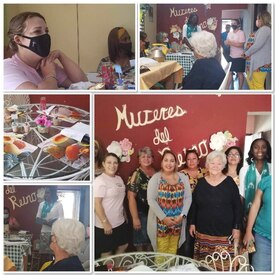 El Comité del Día Mundial de Oración (DMO) en Cuba agradece los cuidados de Dios en medio de este tiempo de crisis sanitaria mundial, y los aprendizajes que de ello hemos podido extraer; volver a lo esencial de la vida, nuevas formas de relacionarnos, valorar la convivencia en familia, autocuidarnos para poder cuidar, alimentar nuestra espiritualidad y ser más solidarias, entre otras muchas enseñanzas. Agradecemos la vida de las personas que coordinan y apoyan el movimiento del DMO a nivel internacional y en cada país, y que con su labor nos ayudan a mantenernos unidas, informadas, orando y actuando. Especialmente agradecidas por la solidaridad de nuestras hermanas, el afecto expresado en mensajes, oraciones y espacios virtuales compartidos. En este sentido, damos gracias a Dios porque los avances tecnológicos nos permiten comunicarnos con mayor inmediatez, celebrar juntas desde la distancia, ver nuestros rostros, intercambiar información y palabras de ánimo. Y porque a pesar de la distancia física, nos sentimos más unidas. Nuestro corazón se encuentra agradecido porque en medio de un contexto global de enfermedad, crisis e incertidumbres, la gracia de Dios y su Palabra, nos dan continuas señales de vida y amor fraternal, para vivir confiadas en nuestro día a día, y mirar con esperanza el futuro. Los desafíosPreparar las actividades del DMO en contexto de pandemia fue muy desafiante. Las iglesias no se estaban reuniendo por causa del Covid 19, y sólo en algunos lugares podían hacerse, con sumo cuidado y cumplimiento de protocolos sanitarios, pequeñas reuniones. Hicimos la distribución habitual de los materiales con la esperanza de que grupos pequeños pudieran usarlos, pero mayormente nos proyectamos hacia lo virtual específicamente para WhatsApp y Facebook que son las redes sociales más asequibles para nuestro contexto, donde el acceso a Internet es relativamente costoso y la conexión inestable. No obstante, la participación en la celebración virtual del grupo de WhatsApp, tuvo muy buena acogida y superó las expectativas del equipo. De modo que las actividades fueron preparadas en medio de la incertidumbre de no saber qué acontecería al día siguiente, pero con la certeza del Dios que escucharía nuestras oraciones en tiempo presente y con visión de futuro. Damos gracias a Dios también porque pequeños grupos de hermanos y hermanas en otras provincias de Cuba donde la Covid19 aún no se había propagado con fuerza, pudieron hacer pequeñas celebraciones presenciales. Varias denominaciones y organizaciones ecuménicas tomaron parte en las actividades. El entorno de la pandemia afectó la participación de los niños/as, quienes se encontraban en aislamiento en sus casas durante la cuarentena, ya que fue limitada la presencia de menores de edad en espacios públicos. En el caso concreto de Cuba, la tendencia es que los niños/as no poseen dispositivos móviles para conectarse a Internet, de modo que, aunque compartimos los materiales del culto infantil con las iglesias, y seguramente fueron empleados en las casas, no tenemos ninguna constancia de cultos infantiles propiamente. El grupo de WhatsApp creado permanece activo para compartir oraciones diarias, con unos 100 miembros habituales y nuevas personas que se suman paulatinamente. Consideramos como un aporte/logro el que podamos compartir oraciones diarias, las cuales son un canal de acompañamiento, ánimo y esperanza para personas enfermas y sus familiares. Poder convocar a mujeres de todas las generaciones y de todas las provincias del país, para el culto virtual, nos dio una bonita perspectiva del diálogo intergeneracional, de la diversidad de dones y afinidades que poseen, y sobre la manera en que podemos construir juntas, intercambiando saberes, habilidades y motivos de oración. Acciones de apoyo a las mujeres y comunidades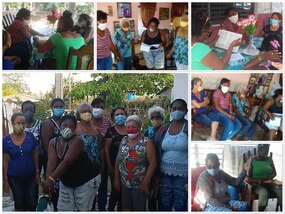 Agradecemos a Dios que en Cuba podemos contar con acceso igualitario a la educación, en todos los niveles, y que, en el caso de las mujeres, son mayoría en las estadísticas de los estudios universitarios. Podemos notar que existe un especial interés en la atención a la infancia y existen proyectos para apoyar a este sector de la población. Por ejemplo, actualmente la FAO (Food and Agriculture Organization) se encuentra desarrollando un programa para apoyar la desnutrición infantil, beneficiando a embarazadas e infantes. No obstante, surgen nuevos desafíos. En la pandemia, muchas mujeres han quedado desempleadas (sector turismo, sector privado, artistas, etc.). Incluso para aquellas que se mantienen laborando, el teletrabajo supone un reto tecnológico y de distribución de los tiempos en casa. En Cuba existe una tendencia de que las mujeres sean las principales cuidadoras de enfermos y ancianos en el hogar. Por otro lado, la crisis económica ha provocado un notable desabastecimiento de alimentos, medicamentos y otros productos básicos, por lo que se generan largas filas en los establecimientos, donde se percibe una mayor presencia de mujeres, quienes tienen un rol importante en la gestión de trámites relativos al hogar y en la tarea de buscar los alimentos. Coincidentemente, en el reporte diario de casos positivos al Covid 19, el mayor número de casos positivos es de mujeres. Cabe mencionar, que la presencia de los menores en casa también supone para la mujer la responsabilidad de acompañar el proceso educativo de los hijos/as, quienes asisten a clases televisadas durante la cuarentena. Estos factores, unidos al contexto de crisis económica y sanitaria, colocan en riesgo la salud física y mental de las mujeres. Para este caso, nuestro Comité desarrolla un proyecto de incidencia en la salud mental de las comunidades, desde el abordaje de la No Violencia, y la creación de recursos de resiliencia a través de las artes expresivas. El DMO Cuba mantiene una estrecha colaboración con el Programa de Mujer y Género del Consejo de Iglesias de Cuba, en sus acciones formativas de empoderamiento de las líderes eclesiales. Para el acompañamiento diario, diseñamos recursos litúrgicos como oraciones, cantos, y otras herramientas formativas que sirvan a implementar una estrategia de autocuidado, redes de apoyo, y solidaridad femenina. Apoyamos en redes mediante las cuales intercambiamos motivos de oración y peticiones de medicamentos para intentar localizarlos y movilizar la solidaridad. También, en nuestras actividades y talleres, priorizamos emplear como facilitadoras a mujeres necesitadas, mujeres jóvenes o profesionales desempleadas, de modo que puedan percibir alguna bonificación temporal por su colaboración. Son pequeñas acciones, a veces de carácter temporal, pero mediante las cuales hemos podido acompañarnos mutuamente. El mensaje hoyDesde finales del año pasado y especialmente en este 2021 han acontecido muchos procesos (económicos, sociales, políticos, eclesiales, etc.) que, acompañados de la pandemia, han venido a agudizar la crisis mundial de la que no estamos exentos, y así a desplazarnos de nuestros habituales cimientos, zonas de confort o seguridades. Desde esta visión, el programa de Vanuatu desafía fuertemente a la Iglesia Cubana a fortalecer sus cimientos en la base firme, que es Dios y a buscar nuevas formas de apoyarnos mutuamente, aportando nuestros dones al servicio del reino, y en favor de los más necesitados. Ser sabio, en el contexto de nuestro país implica, sobre todo, ser creativos y resilientes. La creatividad ante un panorama de crisis económica, sedimentado por el bloqueo y ahora agravado por la pandemia, ha supuesto para cubanos y cubanas, la búsqueda de soluciones concretas, prácticas y cotidianas. La resiliencia ha permitido adaptarse a situaciones de carencia, desde una economía de la solidaridad, un crecerse ante las dificultades, y mayormente, confiar en que Dios nos sostendrá sobre una base firme. La sabiduría debe ir acompañada de la formación, pensando en las nuevas generaciones, que son el presente de la sociedad, y en este caso, también de la Iglesia, los cuales muchas veces carecen de herramientas necesarias para emprender sus sueños y, sobre todo, de valores sólidos. Ser sabios, en esta hora de nuestra realidad, implicará también apoyar a personas vulnerables, con pocos recursos espirituales y materiales, y especialmente a los adultos mayores, que son mayoría en nuestra población. La sabiduría para este tiempo implica enarbolar un discurso de no violencia, de diálogo intergeneracional, de acompañamiento pastoral y de inclusión. Cuba es una isla donde también los ciclones afectan la vida cotidiana durante una época del año. Desde esa perspectiva insular, conectamos muy bien con los sentimientos expresados por la obra de arte de la artista de Vanuatu, y la inspiración del tema. Construir sobre una base firme, en tiempos de profunda inestabilidad, fue un aliciente emocional y espiritual para las mujeres cristianas vinculadas al movimiento. Ha generado, entre otras cosas, el desafío de seguirnos uniendo, animarnos mutuamente en la fe, y obrar juntas creando alianzas de trabajo y saberes compartidos. La metáfora de la base firme, como contenido principal de la celebración, nos ha inspirado a estar más unidas como equipo DMO nacional, reconociendo la solidez de nuestro movimiento, en Cuba, gracias a la misericordia de Dios y la labor de muchas cristianas de nuestro país. - Ruth Mariet Trueba Castro, DMO Cuba
 It amazes me how the 2021 theme “Build on a Strong Foundation,’’ is so beautifully interwoven with the WDP motto ‘Informed prayer, prayerful action.’ The theme has been foremost on my mind, and I began to question what my ‘foundation’ was like. Whilst preparing to speak at a fasting and prayer morning, I also realized how all-encompassing the WDPIC motto is - it is only as one prays that God opens our eyes (informed) and then…. action is the natural outcome! Keeping this in mind, I was led to examine the lives of two women in the Old Testament. Their lives helped me to be ‘informed’ and to realize what a powerful tool prayer is. They are Rebekah (Isaac’s wife) and Hannah. Their prayerful or prayerless attitudes reflect the impact not only in their lives, but also in the lives of their family and even an entire nation. When we first meet Rebekah in Genesis 24, she is a vibrant, adventurous, helpful, happy person who was willing to take risks. If you observe our young girls, it will not be difficult to identify a young Rebekah – so happy, content, and full of life. Rebekah was not only blessed with a loving, caring family (Genesis 24:49-50), she also married into a family that loved her and welcomed her with open arms (Genesis 24:67). On the other hand, our first encounter with Hannah in 1 Samuel 1 is quite the opposite and we meet a ‘deeply troubled,’ barren woman whose rival was constantly provoking her (1 Samuel 1:6). When comparing them, one would expect Hannah to be the ‘loser.’ However, this was not so. Rebekah turned her blessings into a curse. To me the saddest verse in the Bible is found in Genesis 27:13 when Rebekah encouraged her favourite son Jacob to deceive his father and brother. Even when Jacob voiced his reservations (Genesis 27:11-12), she arrogantly told him ‘Let the curse fall on me!’ The greatest blessing for any mother is to see her children not only living righteous lives, but also to be united. Rebekah unfortunately traded these blessings for curses. Her deceit led to disastrous results: Jacob fled from home; and when he returned from Mesopotamia twenty years later, his mother lay buried in the cave of Machpelah, (Genesis 49:31) and Rebekah did not even have the joy of seeing Jacob’s children! Is this not a sad ending to a family that was greatly blessed by God? In contrast, Hannah chose to seek the Lord in her time of distress and transformed her life into a blessing. Her agonizing prayer to her God (1 Samuel 1:13-16) and her faithfulness (1 Samuel 1:20) transformed her from being deeply troubled to a woman greatly blessed (1 Samuel 2:21). She kept her promise and dedicated her first born to God (1 Samuel 1:27-28). A difficult decision, as she knew she could see Samuel only once a year. Hannah was able to experience the blessing of watching her son become a great prophet who went on to influence an entire nation. An amazing woman. Is it surprising that the Lord blessed her? Do you want to act like Hannah or a Rebekah? Are you going to pray intelligently and take prayerful action just like Hannah did? Or will you choose to act like Rebekah? The Lord has left the choice to you! May you make life’s choices prayerfully and thereafter take prayerful action! - Vino Schubert, WDPIC Regional Representative Asia
 WDP Croatia has been organizing workshops and lectures implementing an initiative, called ‘She shall be called woman’ – re/constructing women's identity in the Bible. This initiative began in January 2020 and will end in April 2021. The project discusses female identity, acceptance, self-image, and values that women have before God. We want to contribute to the change in ourselves and in our environment, to be as the Creator imagines us to be, and to leave a mark on the people around us. We are encouraged to reflect on our actions as Christians. In October 2020, we held a workshop on the Island Veli Losini, on the coast of the Adriatic Sea. The theme was “When God calls us to overcome fear”, based on Genesis 1-5 and the Book of Esther 2-9. We gathered 46 participants from 17 to 75 years old, from 9 Christian denominations, and 20 Croatian cities. Among them, 18 women were first timers. For those who were not able to come to the workshop, we enabled the Zoom platform for participants from Croatia, Slovenia and Serbia. We are also thankful to God for guidance, protection and for keeping us safe from the coronavirus. We were allowed to meet and followed the proper protocols. We had a safe gathering! Praise the Lord! We are immensely grateful for our prayers have been answered. In the first part of the workshop, we reflected on God`s plan for human beings (Genesis 1-5). The participants were asked to reflect on their fear and their responses, and identify if and why they would feel intimidated in their communities, churches and homes. Many shared about their fear of speaking up for themselves, or to speak in front of their churches, or even to their husbands. Others said they felt there is no room for them to express what they could really do, apart from the pre-set roles given to them by the male authorities in their communities. One said that she felt in her Church like “an unwanted child.” Reflecting on Genesis 1-5, we understood that the fall should never be construed as God's divine order for us. God created man and woman with gifts and ordained them to walk with Him and be as one, and He would meet the innermost needs of both of them. In the second part of the workshop, we turned to the Book of Esther (2-9) and analysed what happens in situations of great fear. We read the story of Esther and how she changed her attitude from one of “accepting the situation” (passive) to “accepting God’s plan for her” (active resolution). Esther understood what was going on and looked for support in God and in her community. In her response, Esther’s fear was a trigger for her actions. In conclusion, we recognized that religion, as well as the Bible, are an important part of women’s lives. However, we feel bad when we are told that we are less worthy or less equal to God. We are tired of being constantly pointed at as “guilty” for the first sin. None of that brings to light the many examples of women in the Bible who provided godly leadership. Rather, they are samples of the patriarchal interpretation of the Bible. However, we can read the Bible with an interpretation that fosters equality. When open to this perspective, we see women and men equally loved by God. Esther’s courage was not an absence of fear. Rather, it withstands fear. We then discovered that the strongest source of courage in the face of fear is faith. When we place our faith in God, we find the courage to face what seems bigger than we can handle. Let’s be in the power of God! - Senka Sestak Peterlin, WDP Croatia & WDPIC Regional Representative of Europe
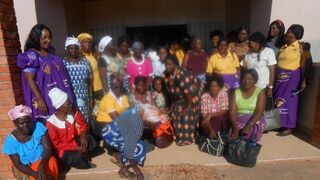 Training in Solwezi Training in Solwezi The World Day of Prayer motto - “Informed Prayer. Prayerful Action” - is the driving force behind the Zambia WDP Committee’s commitment to fostering the empowerment of women and the promotion of gender equality. We have been called to get involved in the livelihoods of the underprivileged. It is our hope to see a prayerful nation and to see justice prevail for the victims of sexual or gender-based violence. Our committee has invested time in strengthening our existing relationships as well as fostering new partnerships with likeminded organizations. Our collaboration with Non-governmental Gender Organizations’ Coordinating Council, an umbrella organization championing for women’s empowerment, led to grants under the Basket Fund supported by the European Union and Embassy of Sweden. The grants were applied to support over 200 women in the Chikankata, Mongu, Solwezi and Kasama districts from 2017 to 2020. All of the projects aimed to contribute to the improvement of the livelihoods of women and youth, increase household incomes, improve literacy skills and train in business management.  WDP members visits Mongu Project WDP members visits Mongu Project This first projects started in the Chikankata and Mongu districts. In Chikankata, land was donated by the Salvation Army Church and a hammer mill was built to lessen the long distances women would have to cover to have their grain (maize and cassava) milled. In Mongu, land was donated by the United Church of Zambia Western Presbytery where a rice huller machine was built. This provides the women with an opportunity for the women to generate an income from shelling rice for different communities. There is still work to be done as the mills need to be connected to the National Grid, however, efforts are being made to ensure the full realization of this project's benefits.  Rice Dehauller Rice Dehauller In Solwezi, women were engaged in a poultry project that was launched in April 2019. The women were trained in chicken rearing and were given 1,000 chicks in two phases. This project promoted and trained women in business management, entrepreneurship, village banking and record keeping. In May 2019, a diesel hammer mill was installed in the Kasama district. There is a need to train more women and youth in pastoral matters so that they can contribute to furthering the gospel of Christ. All these crucial matters can be managed if the resources are available, hence there is a need to increase resources mobilisation to enable the organisations to acquire land to build a multipurpose complex as well as undertaking awareness campaigns on the cross-cutting issues such as child marriage, gender-based violence and HIV/AIDS. WDP Zambia remains committed to its cause in helping the women of our nation. In all things God is able to intervene when called upon as the Bible indicates. A person who builds without the Lord, builds in vain, therefore it is imperative that God should be our foundation and a pillar in all the things we do. - WDP Zambia Committee
 In the course of preparations for WDP 2019, for which Slovenia was the writer country, I was privileged to visit the ASPI Centre twice. I was very touched by their work. ASPI, I have since learned, is the name which Slovenes with Asperger syndrome use to refer to themselves. The ASPI Centre helps and supports adolescents and adults with autism spectrum disorders. They prepare them for independent living, as much as possible, in cooperation with their parents and families. It is located in the outskirts of Domžale, a town in the greater Ljubljana region of Slovenia. The facility has been supplied by the local Caritas. It is a fairly small, longish narrow building with a garden attached in a quiet area not far from the old main road from Ljubljana to Maribor. They have some limited overnight accommodation and offer a series of programmes which include gardening and vegetable growing. They offer individual therapy, classes and activities that enable adolescents and adults to pursue their interests and develop their life skills in a meaningful way. During my visit, I had the chance to see one of the neighbours assisting with the gardening, which appears to be a meeting point for the local community and the ASPI clientele. This Centre is a place to which persons on the autism spectrum and their families can come freely and find acceptance and help; which improves their wellbeing by making them feel more secure and calmer. In Slovenia, there are limited official resources, recognition or understanding of autism spectrum disorders (ASD). Many families live in isolation and unaware of where to turn to for help and understanding. The government and the society still need to research and learn more about it. Official recognition of the disorder would help the organisations get financial aid from the state to assist those people and their families. ASD can be manifested in extreme sensitivity to sounds, light, smells, or interaction with other people and groups. Sometimes schools and churches are not prepared to welcome them, and so they are excluded from many activities that would enrich their lives or be enriched by them. When they are together, they realise that they are not alone or not to be blamed, but their condition needs to be understood so they can count on help to face the frightening world around them. In case you live with a person with ASD or want to create a welcoming environment for them, let me share a few tips. Be aware that noise or light can be quite unbearably painful to them; even music played at fairly acceptable volume. Their repetitive behaviour and gestures, or unwillingness to meet your eye, does not necessarily mean that they would not like to be your friend. They may have no way of interpreting the body language of those around them. They may look like a lonely child, although they themselves may be actively seeking companionship. I have a friend with Asperger syndrome, who is one of the most caring and artistically gifted people I know. She spends much of her life doing voluntary work with old people - who appreciated her care and concern - but could not hold a paid job because somehow “she didn’t fit into the norm.” She must have been in her 40s before she and her sister heard of Asperger syndrome, and it took her another few years to get the necessary medical assessment, and then a monthly pension. But simply understanding her own condition was a great relief to her. It is very important to understand ASD and raise awareness in schools, churches, families, the medical field and government offices. People on the autism spectrum and their families need to be supported and we are grateful to the WDP committees who partnered with us to donate to the ASPI Centre in response to the World Day of Prayer Slovenia service in 2019. Thank you all very much. - Áine Pedersen, WDP Slovenia
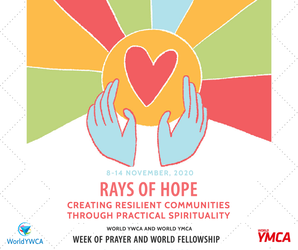 The World Young Women Christian Association (W-YWCA) and World Young Men Christian Association (W-YMCA) are launching the Week of Prayer and World Fellowship from November 8-14, 2020. The theme of the week is “Rays of Hope. Creating a resilient community through practical spirituality”. W-YWCA has a historical relationship with World Day of Prayer, which includes providing leadership for WDP celebrations and active participation in WDP National Committees in many countries. We are, locally and globally, motivating and organizing women and young women for prayers and actions that may impact the communities in the way of peace and justice. The Week of Prayer and World Fellowship “is an invitation to journey as one, and reflect on how we move from an individual calling to collective transformation, creating resilient communities through practical spirituality. Hope tells us that despite the graveness of a situation, good can happen. People have acted to transform realities in their community – tackling misinformation, providing physical, financial, mental and spiritual support in innovative ways, while spreading kindness and reaching out to those in need. Everyone has a role to play, everyone must have access to support, every one matters,” declares the joint message from the presidents of World YWCA and World YMCA. The “Rays of Hope” booklet features daily reflections from several ecumenical partners, including World Day of Prayer International Committee. The booklet is available in English, Spanish and French. The Week of Prayer ends with an online service on Friday the 13th of November at 16:00 Geneva time that will be live streamed on both organizations’ Facebook pages. You may visit the World YWCA or World YMCA to join the service. Through the Week, we will breathe together in solidarity during the current pandemic that is taking away our breathing capacity. We will learn about the young women in Nepal involved in social transformation and fellowship. When addressing social injustices in our communities, we hear the call to action in Jesus’ question - “Do you want to be made well?” (John 5:6-7). The "Rays of Hope" contemplate that finding peace and sharing kindness keep our hope alive. In the world that women and girls and men and boys are screaming, crying out, demanding safety and protection from violence, it is urgent to weave the fabrics of support and transform fear into strong vulnerability and loving trust. Let us regain our breath by praying together the Blessing of Day 1 by Elaine Neuenfeldt: Breathe in this blessing: consider how you might influence ONE life. As you breathe out, speak a blessing on those around you. God bless our world, our habitat. Enable us to respect and treat our earth with the dignity it deserves. Empower us to preserve its resources to provide for all people. Enable us to protect our people, especially the vulnerable: women and children. Enable us to do what is good, resist evil and to protect each other from evil. Enable our men to transform themselves from beneficiaries of patriarchy to contributors of human dignity. Inspire our leaders to be transformed for the good of all people. Enable us to be transformed into Servant Leaders. Enable us to be open to restore your image in us. Inspire us to have healing relationships. Enable us to live with dignity. Empower us to heal our communities and give us your peace. Amen - Rosângela S. Oliveira, WDPIC Executive Director
 We really felt blessed and humbled to be the writer committee for the 2020 WDP worship service. The opportunities given by the collaborative writing process enriched us and let us grow in faith. One of the impacts of promoting the program as the focus country is that it united us. Women from different religious backgrounds, cultures and traditions came together under a common goal for the betterment of our country. It was a wonderful experience which required creativity. In the beginning, we found the theme motivational and a reminder that Christ would give us strength. However, as the days went by, the theme became more relevant, especially because of the COVID-19 outbreak. The theme sounded like a mandate, a mantra and certainly a way of life as the Coronavirus pandemic hit the nations in 2020. In Zimbabwe, the pandemic grouped together with the drought and the economic hardships made us feel that God was speaking directly unto our situation. Our people had to rely on Jesus Christ and His command to “Rise! Take Your Mat and Walk” towards the love and peace of God, which surpasses all understanding, and the reconciliation with the Holy Spirit, who brings healing and restoration to us all. Since the theme was defined in 2012, to the launch of the writing process through the Strengthening National Committee Workshop in 2016, and finally the moment of the celebration in 2020, the message has evolved. Really, God showed Himself to us. God is All Knowing. Our country and all others around the globe must indeed “Rise! Take Your Mat and Walk.” Notwithstanding the disruption in our calendar due to the pandemic, the children and youths were able to undertake a drama which was aired at the Zimbabwe broadcasting studio; they assisted with advertising on social media, sang and danced in the services. They were also involved in projects making sanitary pads, sewing face masks, crafts involving beadwork and donating food to those in need. Little girls from the Girl Guide movement also participated in the activities. These activities showed that all hope is not lost. The children acquired a good foundation as they learnt attitudes basic for their sense of humanity, which are caring for others and catering to their needs. This intergenerational exchange of skills also blessed us all. During the full WDP process as a writer country, we were reminded that despite the dark times, Zimbabwe is still part of a global village. We learnt to appreciate all that God has entrusted us to look after. We learnt a lot about our own country and how to love and embrace people from other religions, cultures, traditions and who speak different languages. We are all God’s creatures. Recently, we also learnt new things such as how to use video conferencing applications (e.g. Zoom) and other technologies to stay connected despite the lockdown due to Coronavirus. More significantly, all nations around the world took it upon themselves to pray for our country. The responses we got from other countries have encouraged us to engage and support other writer countries, thus we are more motivated with next year's program written by WDP women of Vanuatu. There was an overall excitement that took charge of the atmosphere around the world throughout the preparations and services. We heard very positive comments from different churches and organizations. They told us to “keep up the good work.” Others wished they were the ones leading the program. Some organizations indicated that they would like to join in the World Day of Prayer programs and projects. Every woman got involved, regardless of their tradition. There was a great sacrifice by the committee members for the whole program to sail through. To put the materials together with participants from different parts of Zimbabwe and with no access to social media to facilitate our communications was our biggest challenge. Thus, we created a steering committee to coordinate the promotion of the activities and formed sub-committees to help with the fundraising. People were highly supportive of the World Day of Prayer, and gave very good suggestions for the promotion of the activities; we even got support from people in the government. Sacrifice, commitment and dedication are key! Those who managed to attend the worship service before the government ordered a lockdown expressed their gratitude as they felt the service was heartwarming. They were encouraged to propel above injustice, hatred, violence and walk towards Love, Peace and Reconciliation. We look forward to engaging with more community outreach events while we build up and improve on the prayer journey that has already began. Through our ecumenical relationships, we developed partnerships to support the mothers and care givers of Ramangwana Ravo Trust, the Mucheke Old People's Home and Omni Village Rehabilitation and Skills Development Center. Also, it helped birth relationships that empower women to share ideas on how to manage challenges in life and be self-sufficient. This entire experience has reinforced how important it is to pray without ceasing for others and for ourselves. Without God we are unable to do anything. We depend on God for everything. God is God of the impossible. Is there anything too hard for God? - WDP Committee of Zimbabwe  The WDP Zimbabwe Committee's report was published in the 2020 WDP Journal. The Journal captures the lively presence of this worldwide ecumenical movement of informed prayer and prayerful action. Each country's story helps weave the wisdom and enthusiasm that the annual celebration generated in each part of the world. We invite you to view the Journal on our website and read the stories of this year's celebration. 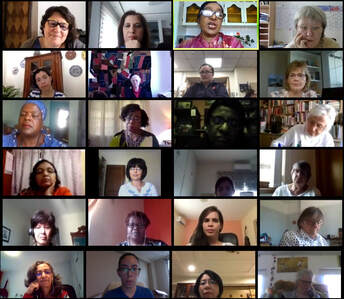 May 27, 2020 - General Meeting May 27, 2020 - General Meeting World Day of Prayer (WDP) is a global ecumenical movement led by women in their communities. It creates an opportunity for building relationships, a spirituality of listening to each other and to God, a prayer informed by the context of women’s lives, and a prayerful action expressed by sharing resources with communities in need. Motivated by a common prayer on the first Friday of March, women lead workshops to learn about the focus country and to study attentively the Bible and the worship service. Together they plan the program for children in schools or churches. The interpretation of the annual theme in the local context and the envisioning of responses are creatively crafted and intensively promoted across the globe. The projects and organizations to support are selected carefully. Most of what we do is based on in-person events where building relationships is the first step of a long journey. However, on March 11, 2020, the World Health Organization (WHO) announced the outbreak of the COVID-19 pandemic. Most of the services planned to be held on the annual day of prayer, March 6th, were held except for in a few countries in Asia and Europe, which were already exposed to the COVID-19 outbreak. WDP Worship Service: The Last In-Person GatheringGovernments around the world set in place measures to reduce the spread of COVID-19, consequently churches and schools were closed for in-person events. Then, WDP activities planned for after March 6th were canceled or postponed, even in Zimbabwe. The committee still nurtures the expectation to hold the National Celebration at the Sports Center in Harare after the lockdown is over and it is safe to gather again, said Sylvia Marowa, “we really want to express our gratitude for the prayers for us from around the world.” In the Cook Islands, the worship service was held with restrictions, and the WDP celebration became the last gathering held in the Cook Islands before the lockdown. “We felt blessed to be able to come together as women of this country to give our thanks to the Lord. The theme is relevant because we have to rise, take up our mats and spread the good news in whatever way we can during the lockdown,” voiced Henrica Marona. The England, Wales and Northern Ireland committee began the Y-Pray Conference in 2016, which “is now held annually in May, to introduce a group of younger women to the movement. The Conference was canceled along with other events, such as Link Days,” informed Elizabeth Burroughs. Manon Naidoo lamented the uncertainty of the well planned 90th Anniversary of WWDP in South Africa to be held during the Africa Regional Conference in October 2020. Taiwan’s experience with the SARS pandemic in 2003, led the government to take early precautions when made aware about the Coronavirus in China. Nancy Lin informed that “the government took over all mask productions and ensured that every single civilian had equal access to buying facial masks. Wearing a mask is required in public transportation and in all indoor public areas such as churches and stores. With masks and keeping social distance, the writing working groups are meeting to develop the worship service program for 2023.” Maral Haidostian, from Lebanon, commented on the difficulties of adopting those precautionary measures for worship services. Listening to Each Other in a Global Conversation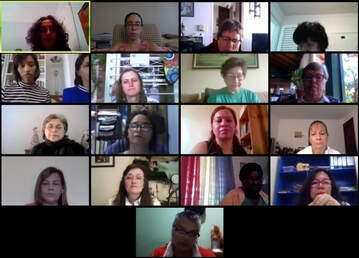 June 12, 2020 - Spanish Speaking Committees June 12, 2020 - Spanish Speaking Committees The WDP International Committee (WDPIC) invited several committees for a global conversation via video conferencing (Zoom) to reflect on the impact of this moment on WDP and the alternatives to move forward. We held four video conferences between May and June - one in Spanish, one in French and two in English. Thirty-nine committees and sixty-three participants from the seven regions joined the conversation, which is summarized in this article. WDP committees are using a variety of tools to keep connected and present to the needs of the communities. They range from rethink the structure and practices to introduce new technologies in communication to reach out to members, friends and local groups. WDP France is considering changing the committee’s structure to reinforce the local connection, stated Christine Méar. “How have we decided to rise, take our mat and walk? We have to reengineer the way in which we do things and seize up this opportunity of involving our regional correspondents, so they can be in contact with their constituents, and linked with the National Committee.” Catherine MacKeil explained that in Canada, they are sorting out WDP grant applications. “With COVID-19, we are unable to support any of the projects with group gatherings, which include a lot of training events. We are focusing on the organizations that are on the frontline of helping people, particularly women touched by violence or human trafficking, and hunger.” Elizabeth Clark, from Australia, pointed out that they do not currently accept direct donation on the website, but to deal with possible reductions in offerings, they may supply transfer details to those interested in contributing that way. Ingrid Mai Pinkes, WDP Argentina, expressed the concern with the currency devaluation on their Annual Contribution to WDPIC. Coromoto Jimenez de Salazar, WDP Venezuela, shared about their committee’s plans to use the offering to provide food to the vulnerable communities in Caracas, although the service could not be held. Keeping the Connection in Times of Social Isolation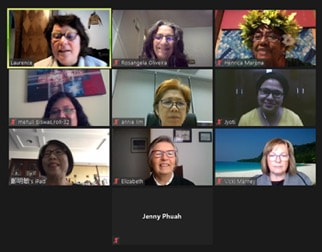 June 17, 2020 - Pacific Region Committees June 17, 2020 - Pacific Region Committees In Germany, the WDP committee is developing a workshop to prepare the facilitators for the Vanuatu 2021 program on an online learning platform (Moodle), explained Irene Tokarski. “We are developing the online platform for our national workshops, which usually happen from June to July, with about 180 women multipliers. We already have responses from most of them. We will have three workshops on the same day as planned instead of the in-person workshops. The digital workshop is a platform where you can do different tasks, for example, research, live chat with other participants, offline tasks like reading the Bible text, or watching a video clip. We will also offer the learning platform for the regional area, because we do not know if we will have another outbreak in autumn.” In Bahamas, the committee asked the young participants for help. The response was so positive that they are planning to have them as the liaison and chairperson mentored by WDP retirees. “Journeying with young women has been a special blessing for us as they have become our teachers in using technology. This inter-generational dialogue has been powerful! Coming out of this crisis, we all realize that a new way forward is necessary. We cannot just ‘make things up as we go along’ and see what will happen. Change, rapid change, unexpected change, is never easy, and not always welcome. But change is inevitable,” said Annette Poitier. Even before the pandemic, WDP committees were using cell phones and instant messaging (WhatsApp, Line) to check on members and friends. Now, they are using instant messaging to send out prayers, remarked Susana Renner, WDP Brazil, or having committee meetings in group chats, shared Berthe Sindjui, WDP Cameroon and Sybille Martial, WDP Republic of Mauritius. As the months advance into the timeline of preparations for the 2021 WDP program, some committees, for the first time, had their regular meeting virtually (Zoom). WDPIC is having monthly video conferences (Zoom) with executive members to replace the canceled annual meeting.  June 20, 2020 - French Speaking Committees June 20, 2020 - French Speaking Committees WDP is increasing its online presence by creating websites and actively using social media platforms (Facebook, Instagram, Twitter). Committees that have not yet made any resources available through their website are considering it, while others plan to expand what they already offer. Social media is used to share the local celebrations, inform about the focus country, post for the Thursdays In Black campaign, and pray for the world. WDPIC posts a prayer on Fridays with the hashtag #WDPUnitedInPrayer. Growing out of the uncertainties of in-person worship services for March 2021 and the current experience with Sunday virtual worship services, many committees are nurturing the possibility of an online service for Vanuatu 2021. Bianka Paz, WDP Guatemala, mentioned their recent conversation about a workshop online with video clips to introduce the materials for the 2021 Vanuatu program. Margarita Cuzco, WDP Paraguay, mentioned their initial conversation about distributing the different moments of the worship service into the communities and finding a virtual space to come together. The Context of Women in the Midst of the PandemicThe vulnerable situation of women during the pandemic was noticed. Families are separated by the lockdown, curfews and closed borders; unemployment, hunger, and domestic violence against women increased. There is shortage of medications and treatments in overflowed public hospitals with COVID-19 patients. In the Democratic Republic of Congo and Brazil, the denial of the health crisis is exposing the population to the uncontrolled virus transmission. In DR Congo, Rose Biasima Lala, commented on their use of local radio to raise awareness about Coronavirus prevention.
Jyothi Singh, WDP India, talked about “the concern with the rural communities who do not have easy access to internet to engage in online initiatives.” Also, in Costa Rica, Rebeca Cascante commented on how the priority is being given to family members who work from home to use the internet rather than women who want to connect with their community activities. WDP has a word of hope to offer There is real pain in the communities with the death of loved ones, an intense feeling of powerlessness to fight the disease and all its consequences. However, there is also strength in being united in prayer. There is trust in God, the sustainer of all times. We lift up in prayers WDP families and communities who are mourning. May God heal our body and soul. It was really inspiring to listen to the efforts made in the midst of so much disruption. WDP leaders are committed to carrying on the message and being present during this difficult moment. We are to walk together in prayer and action. We are to be creative and oriented by the WDP Guiding Principles. WDP has a word of hope to offer. It is time to share it! WDPIC will continue the virtual global conversation to listen to each other, pray for the world, exchange ideas and feel inspired to face the challenges. We may expand on the topics shared by the committees, for example, alternatives to in-person activities, being present to communities in need, and coordinated procedures for online access to WDP materials. The process of developing WDP worship services continues in the midst of the pandemic. The 2021 Vanuatu worship service material is ready and has been electronically distributed. The 2022 worship service program, written by WDP England, Wales and Northern Ireland, will be distributed by September 2020. The writing process with WDP Taiwan for the 2023 service was launched, and we are in conversation with WDP Palestine for the 2024 program. Aware of the uncertainties, but full of hope, we are looking forward to meeting you in 2022, in Scotland, for the International Meeting - “New Heart. New Mind. Called to Hope.” Visit our website for more information and follow our newsletter! The WDP worship service is a tool for listening to each other and God in order to engage in prayer and action with sisters and communities around the world. Together we “Rise, Take our Mat and Walk,” an action oriented message that took us away from the fear inflicted by the pandemic, while the 2021 program written by WDP Vanuatu, will help us affirm the source of our strength to move forward. Together, we “Build on a Strong Foundation” - God’s love and Jesus’ walk on the path of justice. Like the rest of the world, the COVID-19 pandemic has caused immense suffering and confusion in the lives of many people in Asia. A new study by the United Nations World Food Program (WFP) found that lockdowns and the economic recession caused by COVID-19 may exacerbate an already dire worldwide hunger crisis, almost doubling the number of people who could go hungry, pushing a total of 265 million people to the brink of starvation by the end of the year. The COVID-19 pandemic is not merely a global health crisis but also a global humanitarian catastrophe, warned David Beasley, the WFP Executive Director. The various impacts of global warming and climate change resulting in cyclones, flood, locust attacks, earthquakes, and landslides in the midst of this pandemic have further aggravated the suffering in many countries in Asia. Confinement, lockdowns, and quarantines have increased violence against women and children. Measures to curb the disease have worsened existing inequalities, forcing girls out of school and placing them at heightened risk of violence in their homes. Since women and girls undertake more than three-quarters of unpaid care in rural communities in Asia and low-income countries, they are likely to be at greater risk of infection. However, the silver lining in the midst of all this is that there are numerous stories of hope which Asian women are weaving through their dialogue of life.  Garment workers, Bangladesh Garment workers, Bangladesh “True, we were locked in our homes during lock down but COVID-19 does not have the power to lock our hearts filled with compassion and love,” states Daisy Roy (WDP Bangladesh National Correspondent). Daisy Roy, Lipika Florence Sammadar and many other women leaders involved in the WDP in Bangladesh are actively communicating via social platforms and strategizing on how workers in garment factories can be helped during this COVID-19 Emergency Lockdown. Women in Bangladesh are struggling to come to terms with the loss of livelihood as factory workers. They make clothes for European markets, which are laying them off due to mass cancellations of orders. The Bangladesh’s export-oriented garment industry employs more than four million workers and 85 percent of them are women. “Families of garment workers are starving. We are working in partnership with the National Council of Churches in Bangladesh and other interfaith groups to help women factory workers. We are distributing rice, grocery items, food hampers along with soap, sanitizers and personal protective equipment. We are also networking with organizations, federations, and activists who work for the human rights of garment workers,” states Roy. 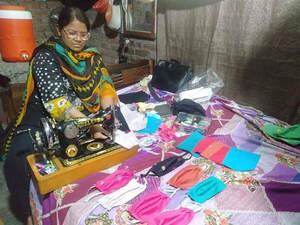 Safety Masks, Pakistan Safety Masks, Pakistan Still reeling under the impact of the coronavirus pandemic, India and Pakistan face a food security situation. “The locust attack in the midst of the COVID-19 pandemic made the situation worse for us in Pakistan. People are dying of hunger and starvation. We are witnessing so much suffering in our own communities. We, women leaders in our churches, started praying and networking to collect whatever food and resources we could to share it with others. We are supporting the families of daily wage laborers, widows, pregnant women etc. We even networked with the Pakistan Army to provide us ration hampers to be distributed. Now we are working to collect health and hygiene materials like vitamins, medicines, sanitary pads and hand sanitizers to be distributed,” says Alyssa Saleem from Pakistan. Saleem is introducing the WDP movement in her Church women’s organization and Diocese. Also from Pakistan, Asyia John is sewing masks for her church women’s fellowship to distribute to the community. “Even if we are poor and vulnerable, we can pray, help and care for one another,” she says. In India, the lockdown hit the migrant workers very hard. Lakhs of migrant workers are reeling in hunger, poverty and find it impossible to reach their homes. Migrants, including women and even children, are walking more than 1000 kms following the railway track or highway trying to get home. Many of them are being hit by lorries or trains in the night. Women are giving birth on the roads, and many are dying of heat stroke and hunger. However, even in the midst of all this suffering, I see rays of hope. These rays of hope are stories of resilience and acts of giving, sharing and kindness which has increased drastically during this COVID-19 crisis. It is not just the privileged and rich who are sharing but even the vulnerable. In different parts of India, women involved in WDP are engaged in humanitarian work by feeding the hungry or supporting those affected by cyclone Amphan, which hit the West Bengal state in India and Bangladesh in May 2020. Women are raising funds to plant trees in the mangrove to restore nature and the livelihood of people in Sundarbans, West Bengal, an area hit by the Cyclone. The mental health of Indian women has become adversely affected by spikes in domestic violence and the stress and anxiety of watching loved ones suffer or die. Women often suffer in a culture of silence. In order to break the silence and care for each other, we have started a WhatsApp group called ‘Food Speaks and Heals’. Cooking can be therapeutic; it can be a cathartic process. This group helps us to connect to one another and share our recipes to boost our immunity. We share our day to day problems, break the silence, care for one another, find solutions and pray together. In Thailand, Rev. Dr. Sirirat Pusurinkham (Former WDPIC Executive Committee member), leads the Prachakittisuk Church, near Chaing Rai, in a community project called ‘Sharing Box’ or ‘Food ATM’. “This project is helping us support people and families, most of whom are undocumented migrants, refugees and economically poor. Jesus has taught us to share our food,” reflects Sirirat. She is also caring for children who have lost their parents to HIV/AIDS and involving the women of her church and community in making masks to distribute during the pandemic. There is so much happiness in giving and sharing in the midst of crisis. Giving and sharing is an act of hope as it heals the wounded and suffering world. Christ has bestowed us the power of resilience, so even if we are vulnerable, we can “Rise, Take Our Mat and Walk” and journey together in healing the world. - Rev. Moumita Biswas, Asia Regional Representative of WDPIC Executive Committee
|
Archives
April 2025
Categories
All
|
|
Home Image: Yoruba dancers at the World Yoruba Carnival of Arts and Culture festival ©Creative Commons Attribution-Share Alike 4.0 International
|

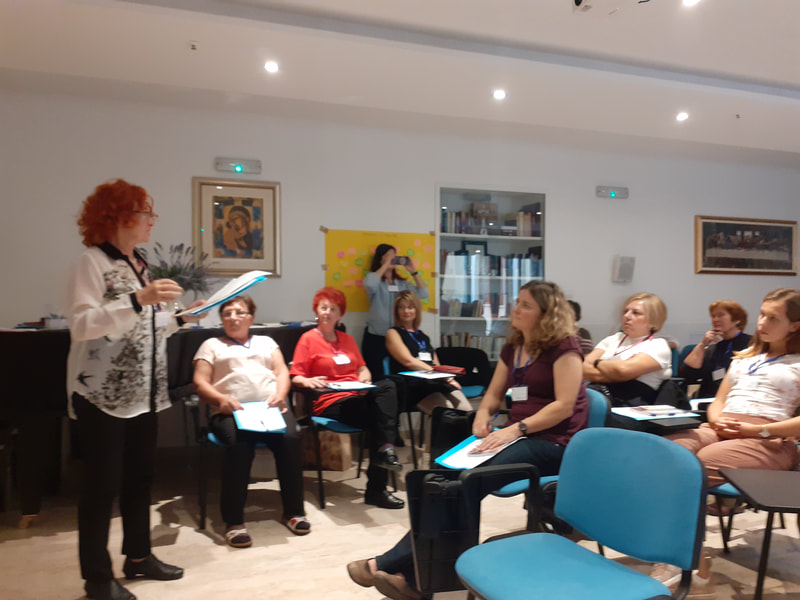
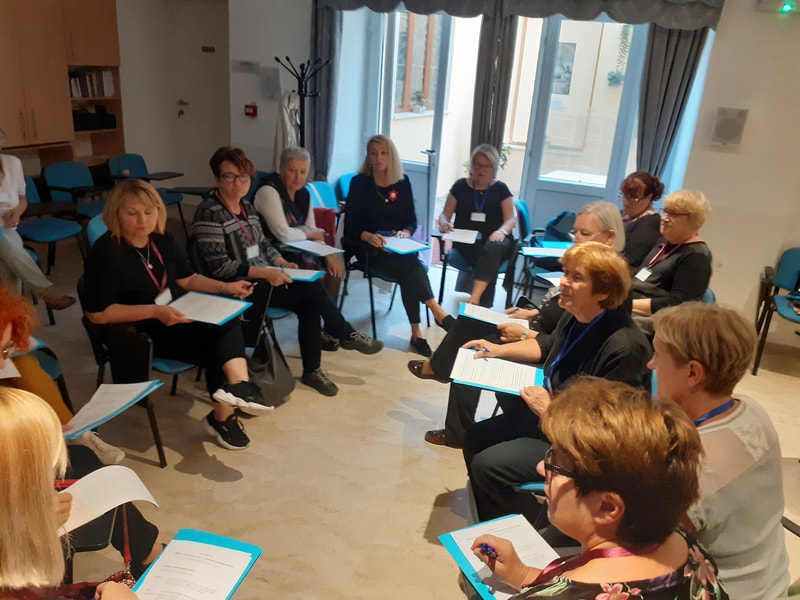








 RSS Feed
RSS Feed